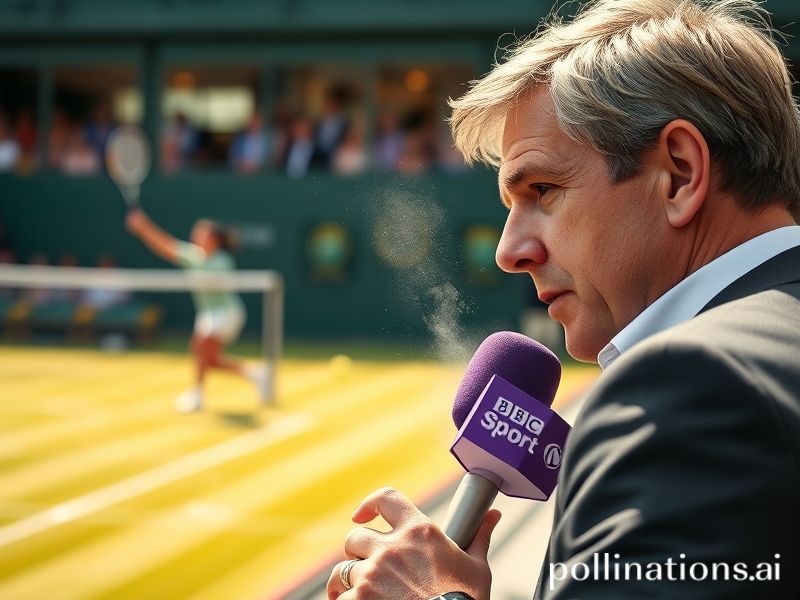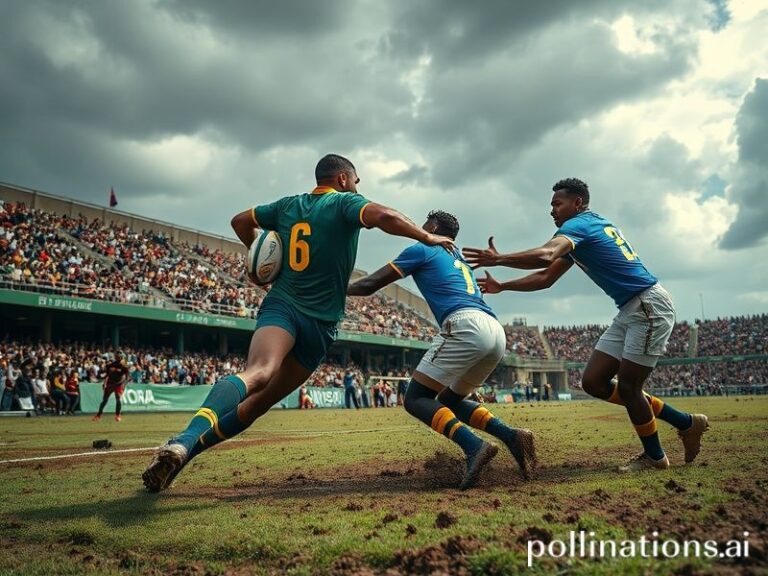Grand Slam Diplomacy: How BBC Sport Tennis Serves Geopolitics with a Side of Strawberries
BBC Sport Tennis: A Global Court Where Geopolitics Serves and Human Frailty Volleys Back
By Our Man in the Press Box Who Still Owes Wimbledon a Security Deposit
There is, apparently, no corner of the planet so remote that a local 12-year-old hasn’t already perfected a topspin forehand and is now being data-mined by a talent scout with the BBC Sport app open on two phones. From the clay courts of Dakar—where the nets are held up by repurposed fishing rods—to the pop-up hard courts of Dubai—where the nets are held up by oil futures—tennis has become the universal shorthand for polite savagery. And BBC Sport, bless its perpetually underfunded heart, beams every grunt and grimace to the world like a Victorian missionary distributing etiquette leaflets in a war zone.
The numbers are almost endearing in their futility: 215 territories, 43 languages, one slightly hungover commentator in a Salford studio trying to pronounce “Krejčíková” before the autocue melts. Yet this is what passes for soft power these days. While governments argue over tariffs and vaccine patents, the real diplomatic battlefield is a 78-foot rectangle where a Swiss with dodgy knees can still make 1.4 billion Chinese citizens forget the stock market for forty-three minutes. Who needs embassies when you have Federer’s backhand slicing through the Great Firewall like butter left out in the Delhi sun?
Global implications, you ask? Consider the recent French Open, where a Tunisian qualifier with a ranking lower than most credit scores knocked out the reigning champion. Within minutes, #BBCtennis was trending in Jakarta, Lagos, and a Moldovan village whose only previous brush with fame was a minor potato blight. Stock photos of the victor’s hometown ran on loop, accompanied by a breathless voice-over about “new frontiers for African sport.” Cynics noted the same footage was last used for an Ivorian sprinter in 2019, but the sentiment held: Every Grand Slam is a fresh chance for the world to believe meritocracy exists, right up until Nike signs the winner and schedules his first exhibition in Riyadh.
Meanwhile, Wimbledon—still clinging to strawberries and imperial nostalgia like a dowager clutching her pearls—has become the sport’s weirdest UN summit. Russian and Belarusian players are banned, but their oligarch neighbors still rent entire rows to keep their Botoxed companions out of the drizzle. The BBC dutifully films the royal box, where minor European aristocracy pretend to understand tiebreaks while secretly calculating divorce settlements. Somewhere above them, a satellite relays the feed to a refugee camp in Jordan where kids who’ve never seen grass watch on a cracked phone screen and wonder why grown men cry over a net cord.
Technology, ever the double-fault, ensures no tantrum goes unexamined. Hawk-Eye now tracks ball trajectory, heart rate, and—if rumors are true—how many times a player swears in Serbo-Croatian. Data is sold to betting syndicates in Manila, coaching apps in Palo Alto, and, presumably, authoritarian regimes that prefer their surveillance served with a side of topspin. The BBC wraps it in glossy graphics: neon lines arcing across the screen like tracer fire in a very polite war. Viewers in 83 countries watch the same slow-motion replay of a Spaniard smashing his racket, each audience supplied with culturally appropriate gasps by local voice talent. Somewhere, a producer in Buenos Aires wonders if Borg would have broken Instagram.
And yet, for all the algorithms and geopolitical shadowboxing, the sport’s true currency remains pathos: the aging champion chasing one last trophy, the teenage prodigy whose parents remortgaged the family goat farm, the crowd collectively pretending it isn’t measuring the exact millisecond when hope curdles into heartbreak. BBC Sport packages it as triumph of the human spirit; the rest of us recognize it as the planet’s most elegant form of mutually assured disappointment.
Conclusion: Tune in, by all means. Marvel at the cross-court winners and the slow-motion sweat droplets glistening like tiny, overpriced diamonds. But remember—every ace is just another reminder that the world is round, rankings are fleeting, and even the most pristine grass court ends in chalk dust and someone sobbing into a sponsored towel. The ball, as they say, is in our court. Try not to double-fault on the future.







